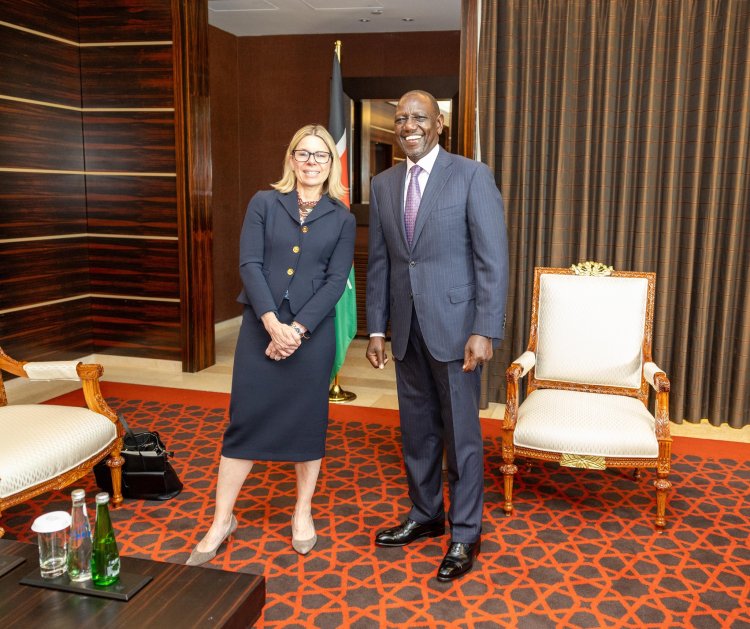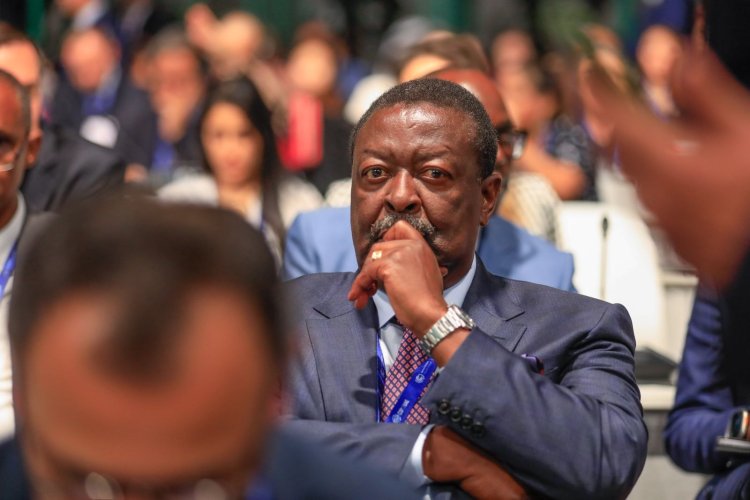President Ruto's Speech At COP 28 [FULL]
As we convene here in Dubai, we must appreciate that the presence of almost 200 nations speaks volumes about the magnitude of this global event and what it stands for.
![President Ruto's Speech At COP 28 [FULL]](https://viraltea.co.ke/uploads/images/2023/12/image_750x_6569e7714a23c.jpg)
President William Ruto on Friday, December 1 addressed delegates at the 2023 United Nations Climate Change Conference or Conference of the Parties of the United Nations Framework Convention on Climate Change (UNFCCC), more commonly referred to as COP 28. in the United Arab Emirates (UAE).
Read his full address below:
1. As we convene here in Dubai, we must appreciate that the presence of almost 200 nations speaks volumes about the magnitude of this global event and what it stands for. This gathering is a testament to the universal recognition that among the multitude of global challenges confronting us today, climate change stands out as, by far, the defining issue of our era. COP28 underscores our shared commitment to confront, with unwavering resolve, a challenge that transcends borders, impacts every facet of human existence and well-being, and demands a concerted global response as a matter of grave urgency.
2. The reality before us is irrefutable: according to the latest UN data, unless there is a significant and radical shift in our economic and industrial patterns, we are hurtling at a perilous velocity on a trajectory towards the dire scenario of a world that is warmer by 3 degrees Celsius. The evidence is alarming – in just the first ten months of this year, we experienced 86 days where temperatures soared over 1.5°C above preindustrial levels. Adding to this worrying scenario is the fact that global greenhouse gas emissions have not decreased, but rather increased, by a deeply worrying 1.2% between 2021 and 2022, culminating in a staggering 57.4 gigatonnes of CO2 equivalent – a record high that underscores the magnitude of the climate crisis we face. We must add that all the increases were experienced in the G20 countries.

President William Ruto with Anna Bjerde, the Managing Director of Operations at the World Bank, at the sidelines of COP 28 in Dubai on December 1, 2023. /PCS
3. This crisis must never be seen as a distant threat. It is here, now, indiscriminately devastating nations regardless of their size or wealth, thereby reshaping our world in profound, unprecedented and highly complicated ways. A stark illustration of this disastrous turn of events is currently unfolding in Eastern Africa, where catastrophic flooding has swiftly followed the most severe drought the region has seen in over forty years. Scientific evidence clearly and strongly links these extreme weather events to human-induced climate change. Studies indicate that droughts are now at least 100 times more likely in parts of Africa than they were in the pre-industrial era. This translates into a dramatic reduction in long-term rainfall, while short-term rainfall patterns remain erratic and unpredictable.
4. All of us are already living in this dire reality. Kenya has been besieged by relentless torrents that have claimed lives and displaced countless communities. The ensuing injury, loss and damage extends beyond immense human toll, to the destruction of vital infrastructure and the disruption of critical supply chains across many vital sectors. Beyond mere logistical challenges, the devastation further complicates the daily struggle for survival for many households and communities.
5. The situation in our Horn of Africa region, like in many other developing countries, lays bare the harsh reality of climate change. It is a poignant reminder of its disproportionate impact and a call to action for all of us to mobilize rapidly to address this imbalance with urgency, solidarity, and inclusivity.
6. We are also here because we are convinced of our collective ability to effect change. Our mission for this COP is clear: to foster radical cooperation that steers the world firmly back onto a 1.5-degree Celsius ceiling. Equally critically, we are here to affirm our commitment to provide robust support to those of us who have contributed least to climate change, yet bear its most catastrophic impacts.
7. As Africa, we are ready to play our part in full. The Nairobi Declaration which we adopted at the conclusion of the first Africa Climate Summit sets out the vision and a pathway for Africa to be a vital part of the global solution to the existential climate challenge we face. The Declaration captures the consensus of the African government leaders for Climate Positive Growth that harnesses our ample human and natural resources. It commits us to triple renewable energy capacity, establish green manufacturing, halt and reverse deforestation, promote sustainable agriculture, promote nature-based solutions, support the global call to phase down coal plants and eliminate inefficient fossil fuel production subsidies and further amplify calls for a new global financial architecture and global carbon tax.
8. In Kenya, we have transformed this vision into tangible goals. Our plan is ambitious: to expand our current energy capacity of approximately 3 Gigawatts to 100 Gigawatts of entirely renewable power by 2050, as a cornerstone of our green industrial strategy.
9. This level of ambition must be matched by the global commitment to achieve concrete, action-oriented outcomes. The first Global Stocktake (GST) at this COP is not just a checkpoint; it is a crucial step forward in our collective response to climate change. It must therefore encompass strategies for mitigation, adaptation, addressing loss and damage, and fundamentally, the means of its implementation. Such a comprehensive approach will pave the way for a more inclusive and robust set of Nationally Determined Contributions (NDCs) in the next cycle.
10. At the heart of our discussions at this COP28 must be a package of ambitious energy transition and investment goals and incentives, aligned with our commitment to maintaining global temperatures within a 1.5ºC limit. This entails a pledge to triple renewable energy capacity, and double energy efficiency by 2030, alongside a significant reduction in fossil fuel dependency. I commend the COP Presidency for their efforts to converge the world around this global goal. The strong participation of traditional hydrocarbon energy leaders in this global endeavour has transformed the conversation and brought us closer to consensus based on democratic inclusion and the best spirit of collective action, as well as multilateralism.
11. Notably, the vision demands deliberate support for developing countries. In the past two decades, only 2 per cent of the three trillion dollars invested globally in renewable energy has reached Africa, despite the continent's vast resource endowment and a great need for investment. The consequences of this investment gap are starkly evident: more than 600 million Africans are deprived of basic energy services, which are fundamental to dignified living and access to essential services such as healthcare and education. The challenge is compounded by the fact that nearly 1 billion people in Africa do not have access to clean cooking amenities.

Prime CS, Musalia Mudavadi at COP 28 in Dubai on December 1, 2023. /PCS
12. A tendency to ignore Africa's developmental and industrialization needs, and the failure to invest in our burgeoning younger generation, is no longer a tenable proposition. We cannot afford to neglect the immense potential or ignore the pressing needs of a continent on the cusp of transformative growth. Turning Africa into a green powerhouse is not just essential for the continent, it is also vital for global industrial decarbonization.
13. Going forward, clear, actionable roadmaps for implementation are required. In turn, this calls for a unified global effort to mobilise the necessary capital for both development and climate action. To echo the consensus projected at the Paris Summit, we must establish a New Global Financing Pact, which ensures that no country is ever forced to choose between its development aspirations and necessary climate action. Fundamentally, this is a call for an integrated approach where economic growth and environmental sustainability are not mutually exclusive but are pursued in tandem for the greater global good.
14. The urgency and magnitude of our task calls for far greater transformation than the incremental progress we have seen over the past 30 years. We need to execute quantum leaps in terms of both our strategic actions and technological innovations. What lies at stake is more than just a climate issue; it is a matter of guaranteeing dignified living and livelihoods for billions who lack basic necessities. Our response must match the scale of this global challenge with boldness and innovation.
15. Given this context, the longstanding adversarial dynamic between the global North and South proves particularly counterproductive. This division has hindered our ability to unite and leverage our collective strengths and robbed us of tremendous opportunities. Yet, in the face of a threat that endangers the health of our planet and our very existence, we must find in collective action a force that neutralises and transcends these divisions. Climate change does not respect artificial distinctions, traditional boundaries and old antagonisms. Instead, it should unite us against a shared, borderless challenge.
16. Consequently, our approach must be collaborative, inclusive, and anchored in justice. This means making decisions that prioritize the well-being of every person while acknowledging that climate action is inextricably linked to social justice and equity.
17. In this room, we have the power, the means and, most of all, the responsibility to act. The world is watching and what we deliver at COP28 will be a testament to whether we are capable guardians of this planet and competent stewards of its sustainability. COP28 and the Global Stock-Take are elements of a strong and clear call to conscience on behalf of the global community. Let us not be satisfied with another minimal increment, but rather, let us make this COP a turning point towards a just, equal world of opportunity, safe from the looming threat of a climate disaster.






